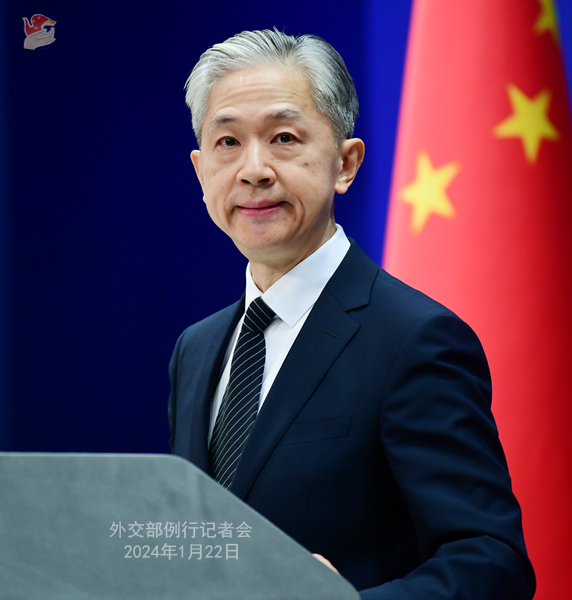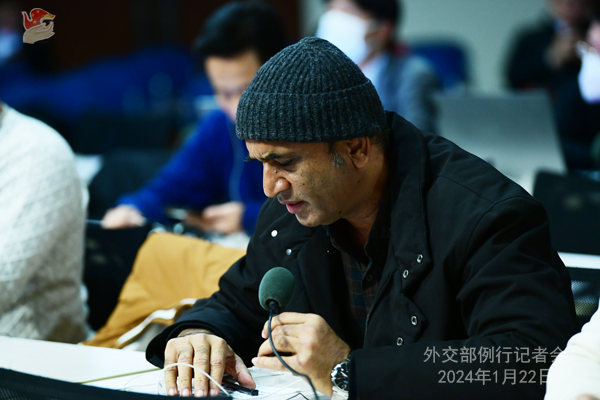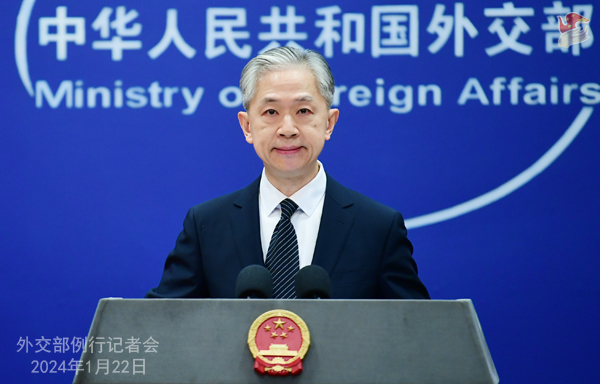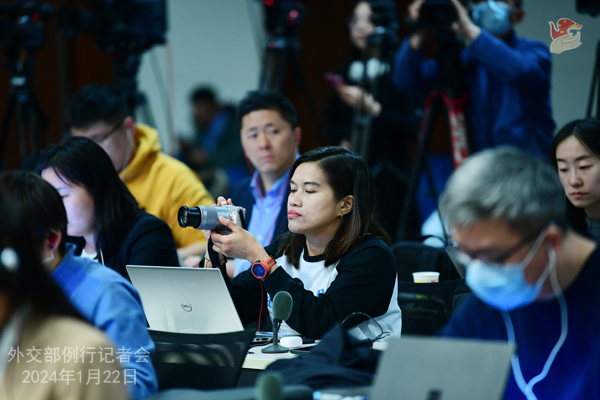| Foreign Ministry Spokesperson Wang Wenbin’s Regular Press Conference on January 22, 2024 |
| 2024-01-22 21:23 |
|
Shenzhen TV: This year marks the 50th anniversary of diplomatic relations between China and Brazil. On January 19, Member of the Political Bureau of the CPC Central Committee and Foreign Minister Wang Yi visited Brazil. Can you share more about the highlights of Foreign Minister Wang Yi’s visit to Brazil and the outcomes and common understandings reached between the two sides at the meetings? Wang Wenbin: During the past few days, Member of the Political Bureau of the CPC Central Committee and Foreign Minister Wang Yi visited Brazil and Jamaica upon invitation. During his visit to Brazil, Foreign Minister Wang Yi met with Brazilian President Lula da Silva, Vice President Geraldo Alckmin and chief adviser to the President Celso Amorim respectively. He also co-chaired the fourth China-Brazil Foreign Ministerial-Level Comprehensive Strategic Dialogue with Foreign Minister Mauro Vieira and jointly met the press. President Lula da Silva noted that since day one after Brazil established diplomatic relations with China, Brazil has publicly supported and adhered to the one-China principle and will stick to this position. Brazil is optimistic about China’s development prospects, and hopes to draw on China’s governance experience and enrich cooperation with China. Brazil shares high consensus on many major issues with China, and hopes to work with China to improve global governance and increase the collective strength of developing countries and their say in international affairs. The Brazilian side also noted that they look to hosting the G20 Leaders’ Summit in Rio de Janeiro as an opportunity to enhance high-level exchange with China, boost bilateral ties and lead the friendship and cooperation between the two countries to another, more promising 50 years. Foreign Minister Wang Yi noted that Brazil is the first developing country to establish a strategic partnership with China and the first major Latin American country to elevate the bilateral relationship to a comprehensive strategic partnership. Relations with Brazil have always been a priority in China’s diplomacy, and China firmly supports Brazil in accelerating economic and social development and playing a bigger role in international and regional affairs. China stands ready to take the 50th anniversary of diplomatic relations as an opportunity to work with Brazil for another “golden 50 years” of bilateral ties. During the visit, the two sides reached a number of common understandings: First, the two sides will jointly implement the important common understandings between the two presidents, enhance strategic mutual trust and keep understanding and supporting each other on issues related to our core interests and major concerns for the benefit of the two peoples. Second, the two sides will continue to advance mutually beneficial cooperation. China and Brazil work together in fields ranging from space to soybean. We will stay committed to the principle of openness, inclusiveness, and mutually beneficial cooperation, better synergize development strategies and elevate bilateral cooperation across the board to a new level. Third, the two sides will jointly strengthen cultural and people-to-people exchanges, enhance the public support of the China-Brazil friendship, offer visa facilitation to each other, and expand mutual interactions. Fourth, the two sides will jointly display the sense of responsibility as major countries and build a community with a shared future for mankind. We will strengthen communication and coordination, uphold the common interests of developing countries, promote an equal and orderly multipolar world and a universally beneficial and inclusive economic globalization, and build a community with a shared future between China and Brazil, and between China and Latin America. During his visit to Jamaica, Foreign Minister Wang Yi met with and held talks with Prime Minister Andrew Holness and Foreign Minister Kamina Johnson Smith respectively. The Jamaican side said it will stay committed to the one-China principle, put China-Jamaica relations front and center and strive for a robust China-Jamaica strategic partnership. China’s modernization sets an example of high-quality development. Jamaica admires China’s remarkable achievements and expects to draw from China’s successful experience for more efficient and equitable development. Foreign Minister Wang Yi stressed that China upholds equality among all countries regardless of their size, greater democracy in international relations and non-interference in any other country’s internal affairs, and will not strive for geopolitical rivalry or force other countries to pick sides. China respects Jamaica for choosing a system and lifestyle with its own characteristics, and supports Jamaica in upholding its sovereign independence and national dignity, and playing a more critical role in regional and international affairs. China expects to better align development strategies, expand cooperation on trade, investment, renewable energy, agriculture, digital economy, blue economy and other fields, and enhance cultural and people-to-people exchanges with Jamaica. Foreign Minister Wang Yi’s visit to six countries in Africa, Latin America and the Caribbean is a continuation of the 34-year tradition of making Africa the Chinese foreign minister’s first overseas destination at the start of the year. It reflects that China, a member of the Global South, shares the same future through thick and thin with developing countries. China will stand on the side of justice and equity, and stand with developing countries, especially medium-sized and smaller countries. We will promote an equal and orderly multipolar world and a universally beneficial and inclusive economic globalization, build a community with a shared future for mankind with all countries, and make new contributions to the development and progress of humanity.
Associated Press of Pakistan: After Iran and Pakistan conducted strikes on each other’s territory last week, the spokesperson of the Ministry of Foreign Affairs said that China is willing to play a constructive role to cool down the situation. I noticed that Vice Foreign Minister Ma Zhaoxu had a phone call with Iranian Deputy Foreign Minister Ali Bagheri Kani last night, and Vice Minister Sun Weidong is visiting Pakistan. Is China mediating between Iran and Pakistan? Wang Wenbin: China maintains close communication with Iran and Pakistan. I want to stress that Iran and Pakistan are friendly neighbors and both are good friends of China. China is committed to upholding regional and international peace and stability and supports Iran and Pakistan in continuing to bridge differences through dialogue and consultation. We would like to continue to play a positive and constructive role in improving the relations between Iran and Pakistan based on the needs of the two countries. China News Service: During the World Economic Forum Annual Meeting 2024 last week, the head of Switzerland Tourism said that they can learn from China, Switzerland wants to welcome Chinese visitors and both countries have winter tourism assets to share. “Switzerland applying to join the tourism competition” became a hot online topic in China. Do you have any comment on this? Wang Wenbin: I also noted the reports. According to a report issued by the China Tourism Academy, as the second ice and snow season after the Beijing Winter Olympics, the 2023-2024 season is expected to see over 400 million ice and snow tourism trips across China, which will hit a record high, and ice and snow tourism revenue reaching RMB 550 billion. China’s booming holiday consumption and thriving ice and snow economy provides powerful impetus for the global tourism market and demonstrates the strong vitality of Chinese economy. As stressed by Premier Li Qiang in his special address at the opening ceremony of the World Economic Forum Annual Meeting 2024, China has a supersize market with rapidly unlocked demand. The Chinese market, with its vast space and growing depth, will play an important role in boosting aggregate global demand. China sees lucid waters and lush mountains as invaluable assets. And winter tourism destinations have become popular around the world. This reflects Chinese tourists’ growing spending power and demand for tourism. This also shows the conviction and confidence that China’s economy will navigate through the choppy waters. It is also an opportunity for China, Switzerland and other countries to enhance mutually beneficial cooperation. We will keep exploring and unleashing market demand, provide broader space for boosting global trade and investment, and inject stronger impetus into the global economic recovery. Nippon Television: According to our report, a group of North Korean IT technicians are doing business in the city of Beijing and earning foreign currency. Some analysts have pointed out that this may be a violation of UN Security Council sanctions. Do you have any comment for that? Wang Wenbin: I am not aware of that. On implementing Security Council resolutions, China has always fulfilled our international obligations fully and in good faith. Bloomberg: The recently reelected President of the Democratic Republic of the Congo said in his inaugural address that the details of the royalty for the Sicomines project will be renegotiated. That was discussed when he was here last year and when he met with Chinese leader. Can you confirm the details of this renegotiation of the royalty agreement? And can you give us the details about when that would be paid and how? Wang Wenbin: I have no information on what you asked about. I’d refer you to competent authorities. Ukrinform News Agency: Last week during the World Economic Forum in Davos, the need for direct dialogue between the leaders of Ukraine and China was mentioned many times. How can you comment on the prospects of such a dialogue, or perhaps negotiations between the two countries’ foreign ministers? Wang Wenbin: China and Ukraine maintain smooth channels of communication and exchange views on issues of mutual interest. The two sides will continue to engage in exchanges in light of the needs in bilateral relations.
Reuters: Two US Congress committees dedicated to investigating security threats and risks posed by Beijing are looking into Swiss engineering group called ABB. They’re looking into ABB’s operations in China, particularly about the installation of ABB equipment by Chinese firm, Shanghai Zhenhua Heavy Industries (ZPMC), onto ship-to-shore cranes that are bound for the US. These committees are seeking to clarify the relations between these two companies. How does the Ministry respond to this matter and has the Ministry reached out to ZPMC about this matter? Wang Wenbin: It seems that the paranoia of some US politicians is getting worse. I would like to ask these politicians: why do they keep blaming Chinese companies for threatening US national security even though they do not have any evidence? Why is it always the industrial champions of China who are being targeted as “threats” to US national security? Why does the US coerce other countries into banning Chinese companies when these countries do not feel threatened by Chinese products at all? From accusing Chinese IT manufacturers of leaving “backdoor” in their products to calling Chinese cranes “Trojan horse” that collect intelligence, and to blaming China-produced EV cells for harming US national security, some US politicians have been blowing up the bubble of “China threat”, while exposing their real aim of suppressing China’s development in the name of national security. For those US politicians, anything advanced from China can be a “threat” and must be stopped by all means; perhaps shirts and socks are the only type of Chinese exports that do not threaten the US. This is sheer bullying and hegemonism. These politicians talk about rules and fair competition, but all they do is to break the rules, play foul to kneecap competitors and deprive other countries of their legitimate right to development. These despicable moves should be condemned and rejected by the international community. CCTV: There are foreign media comments saying that for some time, global talent are “reluctant” to work and live in Hong Kong, and even show a trend of “talent drain.” What’s the Foreign Ministry’s comment? Wang Wenbin: Such comments lack factual basis and respect for the fact that Hong Kong remains the hub of global talent. It is quite irresponsible to discredit Hong Kong’s freedom and human rights situation, for it is gravely misleading for the public. The reality is that Hong Kong’s strong appeal to global talent continues to grow. According to the Hong Kong SAR government, from mid-2022 to mid-2023, the net inflow of Hong Kong residents amounted to 174,000. There’s no so-called “talent drain” in Hong Kong. From January to November in 2023, the SAR government received more than 200,000 applications under various talent schemes. Among them, over 120,000 applications have been approved and 80,000 talents have arrived in Hong Kong, which far exceeded the annual target of admitting at least 35,000 talents. Besides, the International Institute for Management Development in Lausanne, Switzerland released the IMD World Talent Report 2023, which shows that Hong Kong ranks the second in Asia in terms of talent competitiveness. These numbers and facts fully show that Hong Kong remains a popular destination for global talent. Hong Kong has entered a new stage in which the region has restored order and is set to thrive. People there are living a happy life and enjoying lawful rights and freedom. This has created an unprecedented environment and golden opportunities for both Chinese and foreign talent to live and thrive in Hong Kong. We believe that under “One Country, Two Systems”, Hong Kong’s unique advantage of enjoying the backing of the motherland and being open to the world will be further strengthened. Hong Kong will further expand the progress it is making in economic and social endeavors. The region’s appeal to global talent will only grow. The Central Government of China will as always support the Hong Kong SAR in attracting global talent, building new advantages and welcoming world talent from all sectors to share in Hong Kong’s development opportunities and open up a brighter future for Hong Kong. Global Times: After the Independent National Electoral Commission of Comoros announced on January 16 that incumbent President Azali Assoumani won the first round of presidential election with 62.97 percent of the votes, protests have broken out in multiple places of the country, and the US, the EU and France have issued statements questioning the election result. What is China’s comment on this? Wang Wenbin: The presidential election is the internal affair of Comoros. China always upholds the principle of non-interference in other countries’ internal affairs, and respects the will and choice of the people of Comoros. As a good friend and partner, China would like to see social stability in Comoros and continuity in its domestic and foreign policies, and hopes that relevant parties will express their aspiration through lawful means. The international community should play a constructive role, but not resort to interference. Otherwise it will only be counterproductive. China stands ready to work with international partners to support Comoros in maintaining social stability and to play a positive role in upholding peace and development in the region. Bloomberg: You said in your earlier answer about Foreign Minister Wang Yi’s visit to Brazil that China supports Brazil in playing a greater role in regional affairs. Was there any discussion of the new government in Argentina as part of the discussion of Brazil’s role in Latin American affairs and how can China assist with that? Wang Wenbin: I just briefed you on Foreign Minister Wang Yi’s visit to Brazil. Taking this opportunity, I’d like to give you more details on China-Argentina relations. China and Argentina are both major developing countries and important emerging markets, and we are each other’s comprehensive strategic partners. In recent years, China and Argentina have been advancing Belt and Road cooperation. The two sides signed important cooperation documents, including the memorandum of understanding on the Belt and Road Initiative and cooperation plan. We stand ready to work with Argentina to cement political mutual trust, enhance high-quality Belt and Road cooperation, tap on our complementary advantages, deepen equal-footed and mutually beneficial cooperation in various fields and advance the sustained and steady growth of China-Argentina comprehensive strategic partnership. Meanwhile, China stands ready to work with Argentina to elevate the cooperation between China and Latin America.
|
 | ||||||||||||
 | ||||||||||||
|



